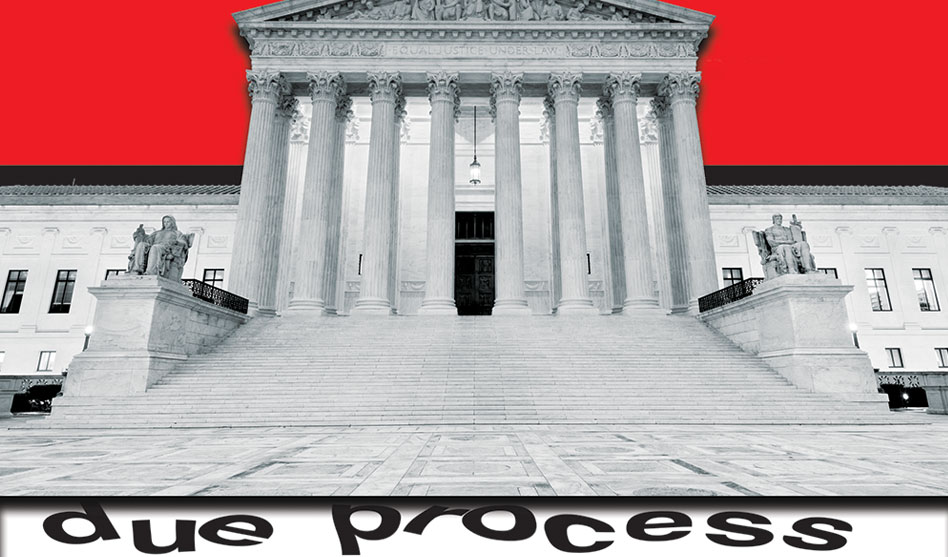Substantive due process is in danger, and that is alarming for all of us
 When cases make their way through the judicial system and arrive at the Supreme Court, the justices must come to a decision utilizing legal and constitutional analysis. Among these methods of analysis is substantive due process.
When cases make their way through the judicial system and arrive at the Supreme Court, the justices must come to a decision utilizing legal and constitutional analysis. Among these methods of analysis is substantive due process.
Derived from the 14th Amendment’s Due Process Clause, which states that a person cannot be deprived of life, liberty or property without due process of the law, substantive due process seeks to define what qualifies as a right according to the clause. First found in Lochner v. New York, many of what we consider to be basic rights were recognized under substantive due process.
A key example of the application of substantive due process is the watershed case Roe v. Wade. The decision in Roe had less to do with abortion itself and more to do with the right to medical privacy, which was violated by Texas’ abortion statutes.
An excerpt of the majority opinion reads, “This right of privacy, whether it be founded in the Fourteenth Amendment’s concept of personal liberty and restrictions upon state action, as we feel it is, or, as the District Court determined, in the Ninth Amendment’s reservation of rights to the people, is broad enough to encompass a woman’s decision whether or not to terminate her pregnancy.”
Substantive due process as a method of analysis has improved life for many in the United States — from racial minorities to same-sex couples.
However, because court decisions established these rights, they can also be taken away in the courts.
This is the threat we currently face.
In 2021, the Supreme Court reversed Roe v. Wade in Dobbs v. Jackson. In the majority opinion, Justice Alito wrote that because abortion has no tradition in the United States, the ratifiers of the 14th Amendment would not have intended it to be a right. In his concurring opinion, Justice Thomas wrote, “In future cases, we should reconsider all of this court’s substantive due process precedents,” arguing that substantive due process is a faulty basis for decision-making.
Two of the cases that Thomas has explicitly stated a desire to revisit are Lawrence v. Texas and Obergefell v. Hodges.
Lawrence was the 2003 case in which John Lawrence challenged Texas’ law banning private, consensual same-sex sexual contact between adults. The Supreme Court ruled that convicting two consenting adults for engaging in sexual activity was a violation of the rights to liberty and privacy afforded by the Due Process Clause of the 14th Amendment.
Texas Attorney General Ken Paxton has, since Thomas’ comments following the Dobbs ruling, said that if Texas were to pass an anti-sodomy law, he would defend the legislation to the Supreme Court in a challenge to Lawrence.
Obergefell was the landmark 2015 case that legalized same-sex marriage nationwide. The Supreme Court ruled that the right to marry the person of one’s choosing is a fundamental right protected by the 14th Amendment.
If the Supreme Court were to overturn either of these cases, the lives of many Americans would be uprooted and flipped upside down; some could potentially face jail time for loving someone of the same sex.
There is some reassurance in the 2022 Respect for Marriage Act, which would require states that don’t allow same-sex marriage to recognize same-sex marriages performed in states where it is legal, in the event that Obergefell is overturned. However, who is to say that the justices wouldn’t strike down the Respect for Marriage Act?
In addition to queer individuals, many others would be impacted by the reconsideration of substantive due process.
Another case that Justice Thomas explicitly named as one to be revisited is Griswold v Connecticut, in which the Supreme Court ruled a woman has a right to receive contraceptives without the permission of her husband. To strike this down would be yet another blow to women’s bodily autonomy.
Substantive due process has guaranteed fair treatment for many; the fact that it is in danger is concerning. The rights of Americans are on the line; if substantive due process were to be thrown out of the window, our nation would be set back decades in civil rights for the LGBTQ community, women and people of color.
We must not allow the likes of Clarence Thomas to deprive millions of their fundamental liberties. The best way to guarantee the protection of substantive due process is to vote. We must rebuild a progressive majority on the Supreme Court, and the only way to do that is by having a president and Senate that will appoint and confirm proper justices.
It is not too late to save substantive due process, but we must act before it is.
Will Reames is a junior at Marquette University studying political science and theater arts. He was raised in North Texas by two moms who taught him the importance of helping others, which is the base of his work.










Well said. Few have explained this so well. And this is why we are no longer in Texas.